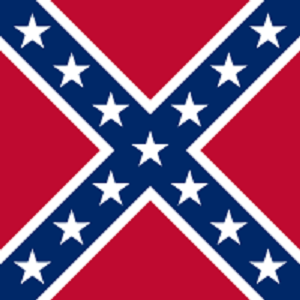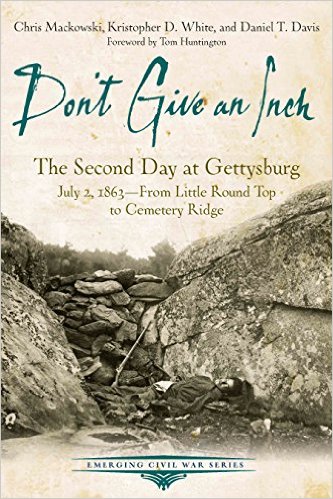
Presidential hopeful Newt Gingrich was recently at a campaign stop in South Carolina, where he fielded questions from the audience. One local resident took the microphone and asked him, “as an historian,” what was his position on flying the Confederate Battle Flag (CBF) on the grounds of the State House in Columbia. Gingrich’s response was pitch-perfect for his audience, simply saying it was a matter that should be left up to the states. The crowd, which had responded with some grumbling and booing at the audience member’s question, broke out into loud applause and cheers.
Gingrich’s answer struck exactly the right tone for an audience of South Carolina Republicans; any invocation of states’ rights is going to be a big applause line. Moreover, Gingrich was substantively right, as a matter of policy: it’s a question that needs to be sorted out among those in the community—in this case, the statewide community—without a lot of meddling by outsiders on either side of the issue. That principle holds equally true in Lexington, Virginia, and Summerville, South Carolina, as much as it does in Columbia. (The South Carolina GOP primary will be held on January 21, coincidentally Stonewall Jackson’s birthday.)
But Gingrich is running for office, and he did what pols are so very good at doing—he completely avoided making any statement about his personal view on the matter, or taking any position in support or opposition to the flag’s presence. As a both a southerner and an experienced political player, Gingrich surely knows that, one way or another, taking any specific stance on the flag, either in support or opposition, is a no-win proposition for anyone seeking national office. It’s a genuine political minefield that’s best left undisturbed, and Gingrich is doing his best to tiptoe past it, unscathed, on his path through the GOP primaries.
The former Speaker of the House is undoubtedly guided in his avoidance of the subject by watching other candidates get caught up in the inevitably divisive politics of the flag. His fellow GOP hopeful, Texas governor Rick Perry, weighed in not long ago on the contentious subject of specialty license plates promoting the Texas SCV, which included the group’s emblem, centered on a CBF. As governor, Perry has no direct say in the matter, but he does have considerable influence on the state’s Department of Transportation board. The board had previously split on approving the plate, but after Perry indicated he didn’t support it, the board voted the proposal down unanimously. The Texas SCV is following up with a lawsuit—which they will likely win—by citing, among other things, the Due Process Clause of the 14th Amendment to the U.S. Constitution, one of the “Reconstruction Amendments” passed immediately after the war. Irony is alive and well.
Perry’s actual statement about the proposed plate was relatively benign, telling reporters in Florida that “we don’t need to be opening old wounds.” Michael Givens, the C-in-C of the national SCV, gave a measured response, saying that “It’s sad enough what Rick is doing. . . he’s just playing politician.” Online, the reaction from Confederate heritage groups was far more inflamed, with one person accusing the candidate of being a “flip-flopping, back-stabbing, scalawag. . . . SHAME ON YOU, RICK PERRY FOR CAVING TO HATERS WHO WILL NEVER VOTE FOR YOU NO MATTER HOW MANY TIMES YOU LICK THEIR BOOTS!” Elsewhere on a Facebook group created specifically in response to Perry’s statement, one commenter was much more succinct: “rick perry is a trader” [sic., traitor].
What’s odd in this case is that anyone expected Perry to make a bold commitment to Confederate heritage in the first place. He’s never, to my knowledge, taken direct action in support of such a measure, or even spoken out strongly in support of heritage issues when he himself had direct say in the matter. Although he was endorsed by the secessionist League of the South in his 1998 bid for Texas lieutenant governor, as an SCV member Perry himself has long been silent on his membership with the group. (Just prior to his official announcement as a candidate for the presidency this summer, Perry’s spokesperson issued a statement that he had never “joined that group nor has he ever paid any dues to it,” which seems an oddly legalistic parsing of words.)
Perry’s supposed commitment to Confederate heritage comes from a statement he made in 2000 concerning two bronze plaques memorializing the Confederacy, which were ultimately removed from the Texas Supreme Court building. (The building had been constructed, in part, with funds left over from the state’s Confederate Widow’s Pension Fund.) When groups like the NAACP complained about the plaques, then-Governor George W. Bush initially supported keeping them in place, as did his lieutenant governor, Rick Perry. But Bush later reversed himself and the plaques were taken down. Perry succeeded to the governor’s office the following year, but more than a decade later, they remain in storage somewhere in Austin. Perry did, in the 1990s, sign a Texas Senate proclamation designating April as Confederate History and Heritage Month, but otherwise he’s never really done much to support Confederate heritage, and his “Confed cred” has always been more wishful thinking and projection than anything actually in evidence.
Other presidential candidates have stepped into this minefield, as well. In 2008, Mitt Romney said of the CBF in a CNN debate that “that’s not a flag I recognize,” and “this country can go beyond that kind of stuff.” John McCain, who in his 2000 campaign had called the CBF “offensive in many, many ways. . . a symbol of racism and slavery,” was compelled to reverse himself just three days later, saying, “I see the flag as a symbol of heritage.” Mike Huckabee, an early frontrunner for the GOP nomination in 2008, took the states’ rights position early on, adding that “if somebody came to Arkansas and told us what to do with our flag, we’d tell ’em what to do with the pole, that’s what we’d do.” Liberals had a field day with the sheer crudity of that one.
But these candidates’ predicament, and the one Gingrich is studiously trying to avoid, is an old story that’s been repeated over and over again over the years. Confederate heritage groups, it seems, work hard to push elected officials into endorsing or espousing highly partisan positions on Confederate history, then express outrage at their “betrayal” when those same officials are compelled to back off from those same positions. In 2010, the Virginia SCV drafted a Confederate History Month proclamation that Governor Bob McDonnell rubber-stamped and issued. The original proclamation omitted mentioning certain elements of the conflict of the war—you know, like slavery—and McDonnell quickly issued a revision. The SCV was, in its own words, “terribly disappointed” in the governor’s action, and were even more upset later in the year when McDonnell announced a new commemoration, Civil War in Virginia Month, that encompassed a much wider range of Virginians, including enslaved and free African Americans, and even Union sympathizers. “Nobody’s ever been able to reason with me and tell me why we’re honoring Yankees in Virginia,” former Virginia SCV Commander Brag Bowling said of the new commemoration. “The only northerners in Virginia were the ones that came to Virginia and killed thousands of Virginia citizens when they invaded.” Okie-dokie, then.
But the ire of folks like Bowling doesn’t end when a pol leaves office; he and Richard Hines, a DC lobbyist and the SCV’s representative on Capitol Hill, went to the trouble a year ago of holding a formal press event to denounce both McDonnell and former Virginia governor George Allen (of “macaca” infamy), to pre-emptively scuttle the latter’s expected announcement that he would run for the U.S. Senate in 2012. The reason? In 2006, feeling stung by his long embrace of Confederate symbols, he claimed to have a better understanding of how the flag is seen by others, saying, “What I was slow to appreciate and wish I had understood much sooner,” Allen told a black audience last month, “is that this symbol . . . is, for black Americans, an emblem of hate and terror, an emblem of intolerance and intimidation.”
The list goes on and on. When Nikki Haley, the current Republican governor of South Carolina, was a candidate, she was subjected to a grilling by a local secessionist group, the Palmetto Patriots, on the importance and meaning of the flag. Haley Barbour, once considered a leading candidate for the 2012 presidential race, bowed out after making some foolish comments about the White Citizens Councils in the Mississippi of his youth; fairly or not, that fact that he had a Confederate flag, signed by Jefferson Davis, hanging in his office ended up getting prominent mention in subsequent news stories about him. Governor Roy Barnes, a Democrat who played a key role in changing the Georgia State Flag to an earlier form that, while recalling the Confederacy’s “First National,” removed the CBF originally placed there in 1962, likely lost his bid for reelection in 2002 in part as a result of that action. Republican governor David Beasley, who originally supported keeping the CBF on the State House in Columbia, South Carolina, but later ordered it moved to the Confederate monument on the grounds, where it remains today, was defeated in his re-election bid in 1998. Although there were likely several reasons for his defeat, the Confederate heritage movement sees it as a direct result of his actions with the flag.
Democrats are not entirely exempt from Confederate heritage dust-ups; Howard Dean, an early frontrunner for the 2004 Democratic nomination, stepped in it when he casually remarked, “I still want to be the candidate for guys with Confederate flags in their pickup trucks,” seemingly equating that flag with Republican voting habits. The current president has continued a long tradition of sending a memorial wreath to the Confederate monument at Arlington National Cemetery, over the protests of a number of prominent Civil War historians and the ever-shrill anti-Confederate activist Ed Sebesta. But these disputes seem relatively minor compared to those that perenially stalk GOP candidates, because there’s no great expectation that Democrats are sympathetic to Confederate heritage. Conservative Republicans, by contrast, are frequently called upon to assert their bona fides in this area, and usually get themselves into trouble when they do.
I’d be surprised if many southerners are actually riled up about the Confederate flag one way or another, but as with all things Confederate, a relatively small group of folks make a lot of noise. The Confederate Battle Flag is often the focus of such disputes, which seem to serve little more purpose than to add more rancor and divisiveness to the mix. (As if present-day politics needs more of those things.) Confederate heritage advocates do their preferred candidates no great favors by pushing them to adopt positions that they will have to walk back or disavow later in the general election. It’s a common theme among Southrons about how this or that politician has “betrayed” them by reversing himself on some Confederate heritage issue, yet again and again they push candidates to stake out position that any reasonable person would see, they will ultimately be forced to abandon. What heritage advocates, like hard-core single-issue voters of all political persuasions, miss is that by demanding that the candidates toe the line on issues like this, they’re doing themselves more harm than good by forcing their candidates to adopt positions that simply don’t appeal to the general electorate.
Andy Hall is a Texan and Southerner by birth, residence and lineage, with a family tree full of butternuts. With a background in history, museum studies and marine archaeology, Hall also writes at his own blog, Dead Confederates.
Image Credit: Wikipedia.
